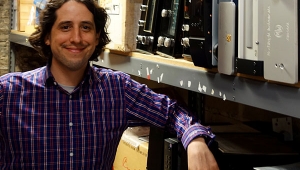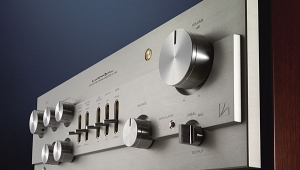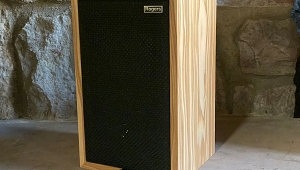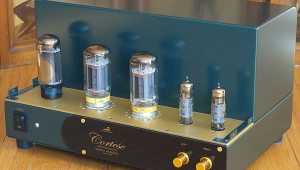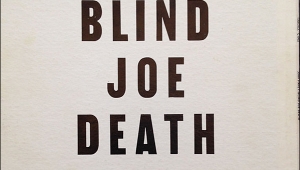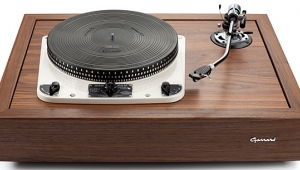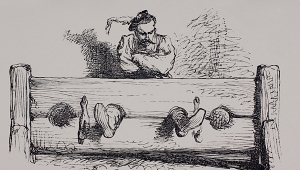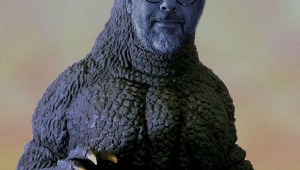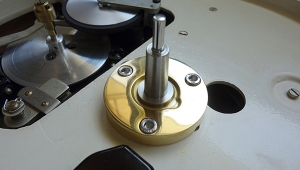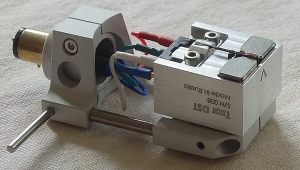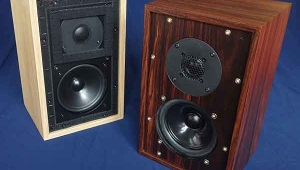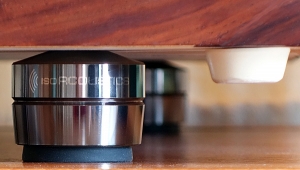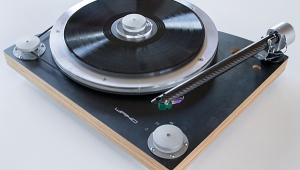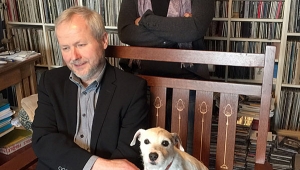| Columns Retired Columns & Blogs |
Listening #62 Page 2
Don't forget: Not only are many large concert venues now sponsored by corporate merchants, the tours of most major pop performers are underwritten by corporate sponsors who want to use music and musicians as advertising vehicles, to sell you more things you don't need. On the last Rolling Stones tour, for instance, Mick Jagger's wobbly old-lady arms were brought to you by Mateus Rosé. It's anyone's guess how many people in the audience wore overpriced clothing emblazoned with ads for Donna Karan and Nike. Jesus H. Wept.
Footnote 1: Exceptions abound. On the one hand are pop studio creations such as Sgt. Pepper's Lonely Hearts Club Band and Skylarking. On the other are modern classical works that can't be performed, wherein the original is, in fact, the score itself.
Reality
I'm not complaining about Carnegie Hall. The last time I went there, it cost me only 40-odd bucks to hear David Robertson conduct Johannes Brahms's Ein deutsches Requiem and John Adams's masterful On the Transmigration of Souls, the latter a work for orchestra, chorus, and pre-recorded sounds that happens to be monumentally expensive to stage. I left the less-than-sold-out hall with tears in my eyes, and bought Lorin Maazel's fine 2002 recording of the Adams work just a few weeks later. That concert was a great deal for a music lover—better, even, than finding a close-out special on that turntable you've always wanted, or buying an amp on accommodation.
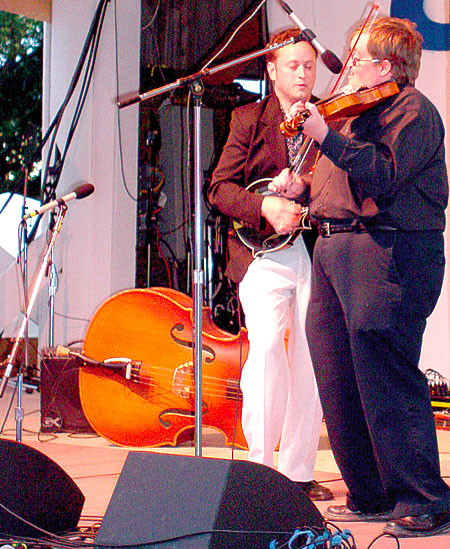
I'm not complaining about ignorant drunks. People who go to bars and wedding receptions have every right to get drunk, and if they're Americans, they also have the right to remain ignorant. No drinking establishment can reasonably be expected to consult all of their patrons in the hiring of entertainment; no professional musician can reasonably take a dollar without some inkling of how unpredictable the job can be.
I'm not even complaining about Hannah Montana, or the marketing experts who write her songs and package her public appearances: Like electric air-freshener dispensers, flavored vodkas, dog perfume, monster trucks, pizza with molten cheese inside the crust, and other products, that performer and her music would not exist if the public hadn't already expressed an enormous gaping desire for them.
All right, I lied: I am complaining a little about Hannah Montana. But not a lot—partly because I don't want to turn into one of those bitter old men who scream bloody murder when other people enjoy life in a manner of which they disapprove, and partly because the sad state of affairs I've described is inevitable. And it's all our fault.
It's our fault because, to the extent that the average Joe believes that the technology of music reproduction just gets better and better by the day—whether or not that's true—the value of live music continues to decline.
Art vs Commerce
In order to bring music to the masses, science and commerce had to join forces and transform art into a commodity—a product. I'm not sniffing when I say that. It's just the simple truth; something we have no choice but to accept.
Virtually every oil painting that's worth looking at (and a few that are not) has been photographed and reproduced in countless books, magazines, and posters. Yet the value of the originals keeps going up, along with the public's desire to see them in person.
In film, there's no original in the accepted sense; there's no absolute car-chase sequence: The whole thing's made up. The public, for its part, has demonstrated its willingness to consume video product in whatever way the industry tells it to: cable, VHS, DVD, Blu-ray, or a suppository-shaped E-PROM, if that's what it takes.
The art of music is different. There are original musical works, but most such things are performances (footnote 1), existing only for the musicians and the listeners who were connected together at that moment in time, and are thus impermanent. Once an original work of musical art is heard, it ceases to exist, apart from the residue of its impact on the listener. And while a recording of that work might be appreciable as art in its own right, its relationship to the original runs no deeper than the one that exists between, say, the Mona Lisa and a snapshot taken of it by a vacationing Spaniard.
Yet the recorded arts are as necessary as they are inevitable. Most of humanity will never hear an orchestra perform Beethoven's Symphony 9, just as most of humanity never heard King Oliver, or Sergei Rachmaninoff, or the Beatles perform live, and will never hear all of the performances that I hope are yet to come.
The success of the first commercial phonograph records is said to have shocked even their makers. People from all walks of life showed a nearly insatiable appetite for recordings by musical stars such as Jimmie Rodgers and Rosa Ponselle. For the first time in the history of the opera, the symphony, the wind ensemble, it was possible for people who lived anywhere on Earth to actually hear one.
And while informal histories note that early experiences with the phonograph were accorded the same reverence as performances by the artists themselves—some recordings were trotted out on only the most special occasions—the popular appeal of recorded music soon broadened to include the notion of convenience: Not only was it possible for a music lover who didn't own formal wear or live near a major metropolitan city to hear a symphony, it was possible to hear it naked, or in the back yard, or while reclining in an overstuffed chair.
Or—and here's The Big One—while doing something else at the same time. Like reading. Or eating. Or washing the car. Or having a conversation. Is it a coincidence that one of the first truly high-fidelity recordings of classical music—Walt Disney's Fantasia—presented the music as an accompaniment to something else?
Then came under-dash changers for playing 45rpm records in the car. And Bill Lear's 8-track tape. (Ford had it first, but John Deere wasn't far behind—seriously.) And the Sony Walkman. And the Sony Discman. And the Apple iPod. And the Halliburton Hiney-Chip. (Okay, I made up that last one.)
Throughout the 130 years between Edison and now, it has become more and more easy for consumers to hear their music, wherever and whenever they wish. That's good. At the same time, to those same consumers, music has had less and less worth. That's inevitable.
That sounds depressing, but it isn't—not to me, at least. I've always made sure to keep listening special. I tend not to listen to music while driving, and I wouldn't dream of listening to music while skiing or jogging or mowing the lawn. When people try to yammer at me while I'm listening to music, I either walk away or ask them to shut up. Once I even asked a convenience-store worker if she would please, for Christ's sweet sake, turn down the outdoor music system so I could concentrate on refueling my car.
It also helps that I get most of my recorded music from LPs, the playing of which involves at least a modicum of ritual: Remove the record from its sleeve; pause to admire artwork that's large enough to actually see; clean the record; clean the needle; lower the arm; hurry to my seat before the music starts (footnote 2).
My daughter has a CD player of her own and a small collection of discs—mostly by her favorite group, the Beatles. She wants an iPod. I think that's because iPods are cute, and because some of her friends have them, but it isn't wise to condescend. And in any event, the rural setting of our house has limited our connection choices to dial-up: Downloading is impractical—for now. In the meantime, I admit that I hope my own listening habits will rub off on her.
My life as a consumer of recorded music remains a happy one; my life as a consumer of live music gets a little worse every time out. During the last five or so years I have not been to a single classical music concert that was not disturbed by the ringing of a cell phone. And during that last trip to Carnegie, a woman sitting in front of me spent much of the hushed opening bars of the Brahms Requiem nattering away at her companion—after which she began eating from a bag of food she had apparently brought with her.
Even the summertime bluegrass festivals I love so dearly have begun to suffer. At last July's Grey Fox Bluegrass Festival in Ancramdale, New York, I had to leave my seat a number of times just to get away from the cigarette smoking (which is banned from the audience area, but who can enforce such a thing?). And that was nothing compared to the windy Saturday afternoon when I and a few adjacent listeners were forced from our seats by a mom in the next row who thought it was acceptable to change her youngster's diaper without leaving her seat. Dodging shit at a concert isn't as rare as you'd hope, but seldom is it so literal.
That night I was heading toward the beer concession when I heard the sounds of a string band coming from somewhere other than the stage. I followed the music and came upon guitarist Audie Blaylock and the young fiddler extraordinaire Michael Cleveland: They had finished their set—which was thoroughly brilliant—not long before and, on the way back to their tour bus, they'd apparently decided to stop and play just a little more, for whoever might want to listen. I stood as close as I could get in the small crowd, which at times threatened to swallow them up.
Late in the evening, about sundown
High on a hill, just above the town
Uncle Pen played the fiddle; Lord, how it would ring!
You could hear it talk! You could hear it sing! (footnote 3)
My favorite scene in François Truffaut's film of Ray Bradbury's Fahrenheit 451 is the final one, in which the dissidents, who've been exiled from their homes in the cities, wander through the wilderness, sharing with one another the bits of literature they've committed to memory. It reminds me of the music I love the best: a heritage shared among a relatively small band of enthusiasts, trying their best to keep it alive—and, in the process, to keep themselves alive.
Later last summer, at one of the smaller festivals I attend, I didn't even get as far as the audience area. I ran into some musician friends in one of the camping areas, and since we all had our instruments, we started to jam. We stood in a circle, trading solos on one tune after another: "Jenny Lynn." "Gold Rush." "The Dusty Miller." "Jerusalem Ridge." "Spider Bit the Baby." "Devil's Dream." "Wheel Hoss." At other campsites, other groups of musicians were doing likewise. Festival attendees walked along the path under the big pine trees; they stopped and listened, made requests, applauded the solos that worked the best. They smiled, and we all said "Hi" and "Bye" and that we'd see other at the next festival down the road, which was often true. It was heaven. Heaven will be like that.
My life as a consumer of recorded music remains a happy one. My life as a semi-professional musician is going to hell in a handbasket. I foresee a day when I'll make a respectable person out of myself and just start doing it for free.
Footnote 1: Exceptions abound. On the one hand are pop studio creations such as Sgt. Pepper's Lonely Hearts Club Band and Skylarking. On the other are modern classical works that can't be performed, wherein the original is, in fact, the score itself.
Footnote 2: My Sony SCD-777 CD player takes almost as much time to load a compact disc and begin playing. Perhaps that's one of the reasons I like SACD so well.
Footnote 3: From "Uncle Pen," written and recorded by Bill Monroe in 1950.
- Log in or register to post comments
